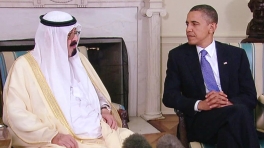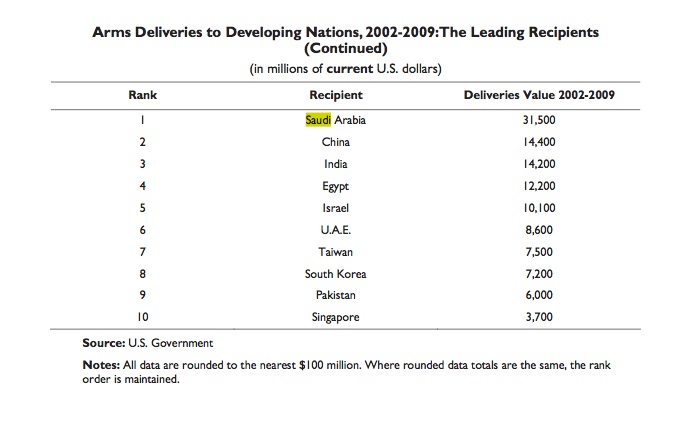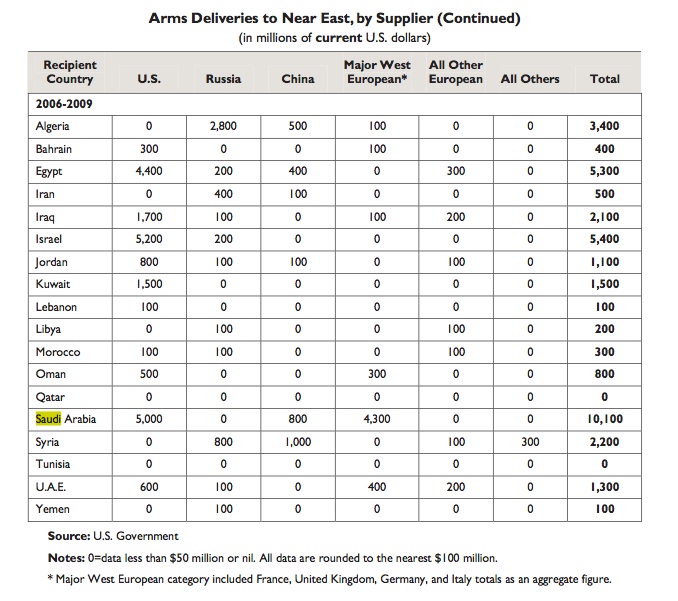 He didn’t exactly campaign on peace, but who expected Barack Obama to sign off on the largest US arms deal in history less than halfway into his first term as President?
He didn’t exactly campaign on peace, but who expected Barack Obama to sign off on the largest US arms deal in history less than halfway into his first term as President?
The planned $60 billion deal with Saudi Arabia has been in the works for awhile, but has made fresh headlines around the world following a Wall Street Journal story last week.
The WSJ led with Obama’s likely pitch: It’s about jobs.
That explanation wasn’t enough for journalists forced to follow up the story, including the Atlantic, which says: “It’s About Iran.”
I suspect the WSJ’s straightforward version is closer to the truth, substituting the Washington code word “jobs” for “massive government spending, a small portion of which may trickle down to the corporate workforce.” Couldn’t this well-publicized $60 billion arms deal simply be about SIXTY BILLION DOLLARS?
The press is calling it the biggest arms deal ever, although I suspect that reckoning excludes the value of nuclear cooperation agreements and other similarly hard-to-calculate exchanges.
To add some context to that figure, $60 billion is in the ballpark of the state budget of Texas and the annual revenue of Apple Computer.
It’s about one-twelfth the size of Obama’s economic stimulus package, which was supposed to put tens of thousands of laid-off Americans back to work.
And it’s nearly double the value of all arms deliveries to Saudi Arabia in the past seven years.
That last figure comes from a Sept. 10 Congressional Research Service report, “Conventional Arms Transfers to Developing Nations, 2002-2009” (pdf). During that period of time, Saudi Arabia was the world’s top buyer of weapons in the non-Western world, and the US was the top seller.
 Egypt and Israel have also been major customers, as this chart shows.
Egypt and Israel have also been major customers, as this chart shows.
 Save for half a billion dollars in deliveries from Russia and China, Iran was frozen out of the arms market, even as the US and Western European countries supplied the Islamic Republic’s neighbors with billions of dollars worth of warships, military aircraft and missile defense systems.
Save for half a billion dollars in deliveries from Russia and China, Iran was frozen out of the arms market, even as the US and Western European countries supplied the Islamic Republic’s neighbors with billions of dollars worth of warships, military aircraft and missile defense systems.
So, Atlantic contributor Jonathan Tepperman is correct when he writes that the $60 billion deal with Saudi Arabia is about the US posture toward Iran.
I just don’t understand why Tepperman finds it “particularly striking” that the sale comes in a year when US arms sales are down by 9 percent.
The timing of the sale makes a lot of sense, if you take the Obama administration at its word. From the WSJ:
“It’s a big economic sale for the U.S. and the argument is that it is better to create jobs here than in Europe,” said one person close to the talks.
Boeing Co., which makes the F-15s, the Apaches and the Little Birds [to be sold], believes the Saudi package would directly or indirectly support 77,000 jobs across 44 states.
That’s the genius of the military-industrial complex—the system spreads the financial rewards of war production across hundreds of Congressional districts, handicapping any political opposition to new military spending.
Here’s more context on the decline in US weapons sales, from the CRS report cited above:
Worldwide weapons orders fell in 2009. The total of $57.5 billion, was a decrease from $62.8 billion in 2008, or 8.5%. Yet for the United States, the decline in its value and share of worldwide United States weapons agreements total in 2009 was ($22.6 billion or 39.3%) falling from $38.1 billion or 60.1% in 2008. These lower U.S. figures can be generally attributed to the number of high value arms transfer agreements signed in 2008; totals not usually duplicated two years in a row.
In other words, in order to maintain a high level of weapons production—which, in turns, props up local economies around the US—a big foreign sale such as this was necessary.
So, commentators, put your global chessboards aside for a moment. This deal is Obama’s effort to buoy the national economy, and thus help his party’s chances in future election years, without proposing any major changes to US foreign or economic policy.
Sure, it’s probably short-sighted. Politically, however, the deal is an obvious winner for Obama. The Saudi aircraft orders will keep Boeing’s production lines humming for a few more years—and who will be upset about it, except for a few peacenik voters, and any unfortunate collateral damage-to-be?